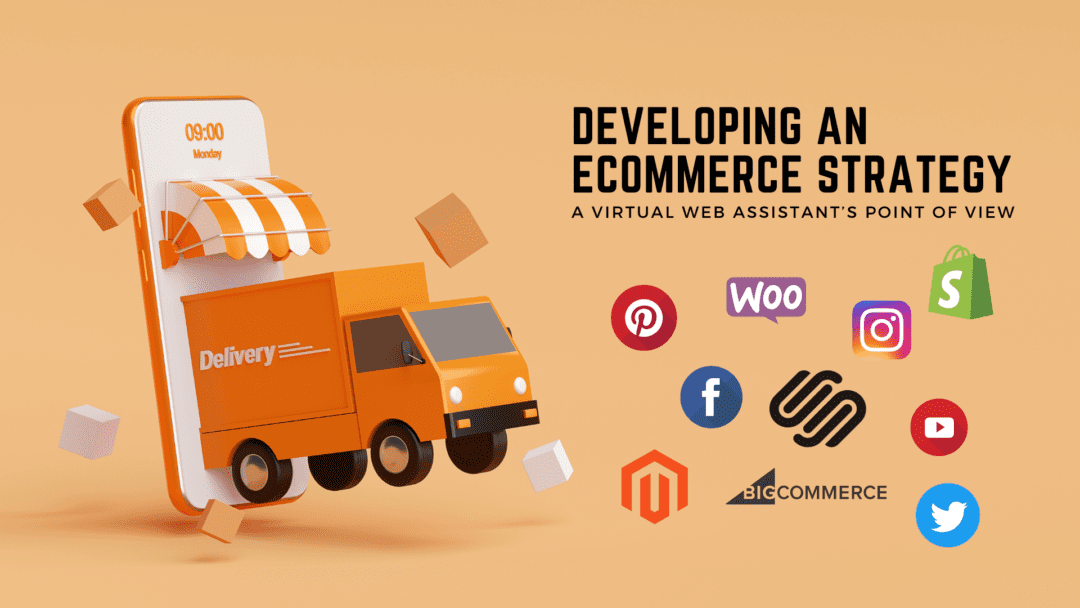If you run an online business, you need an ecommerce marketing strategy. This will help you to set your goals, understand how best to reach your target audience and measure your progress. The more organised you are, the better your chances of success. And you can do this with an in-house team, or by using a resource like a virtual web assistant – someone who can help with product updates, blogs, social media and even customer service. All you need is a good quality plan that is going to deliver results.
According to a recent article on Hubspot, 60% of people research a brand online before making a purchase. So if you are selling your products exclusively online, you need to be in front of those people when they are researching. That will make them aware of you, help them to be more interested in what you’re doing and think about making a purchase from you.
What is an ecommerce strategy?
It’s not just about which social media channels you use or whether you need email campaign management services. It’s about your overall approach, and the targets you want to meet. So in order to put your strategy together, you need to think about:
- Who is your target audience?
- How much might they spend with you?
- Where do they hang out?
- What interests them, and what puts them off buying?
- What will you need your ecommerce budget to cover?
- What type of campaigns might you run?
- How will you measure results?
- What is your target return on investment?
Things to consider
Your ecommerce strategy will be made up of a number of strands. This includes how you are going to resource your strategy to make sure things get done. For example, if your strategy includes adding new blogs, guides or advice pieces to your website, you might need to investigate a web content service. If you are going to be collecting a lot of information from your customers, you might need a CRM system or a data entry solution. Or you might be considering using a virtual assistant for social media support.
All of this will depend on what’s in your strategy, and we’ve put a brief guide to this below:
Make sure people can buy easily – the foundation of your strategy is ensuring that the buying process is quick, easy and smooth. Customers have high expectations of ecommerce, based on their frequent use of large ecommerce sites such as Amazon, eBay, Etsy and other large retailers. So your website needs to be technically ‘clean’ allowing it to load quickly – research suggests that conversion rates drop by an average of 4.42% with each additional second of load time. Your sales process also needs to be straightforward, including the emails or messages you send once a purchase has been made, and the way your customer service team responds to queries.
Get your website in order – for ecommerce, your website is where your customers interact with you. Make it easy for them to find products, have useful product descriptions, make sure pricing is clear, including delivery costs, and give your potential buyers plenty of information. The more information you have on the website, the less your team will have to deal with enquiries or questions – use your website to its full advantage.
Consider SEO – ecommerce is a competitive business. Do some keyword research so that you know what your target customers are looking for. Run an analysis on your competitors too so that you know what they are being found for. Then use those keywords to optimise the content on your website, including your product descriptions. Also use them for any advertising campaigns you’re running, and on your social media and across any other sites where you sell. Don’t forget to add keywords to your image descriptions and your search results snippets so you are always relevant to your customer’s search.
Content strategy – part of your ecommerce strategy is about how you raise awareness and give people the information they need to make the decision to buy. Content covers a wide range of tasks, from social media posts to blogs and newsletters. These are all ways you can get your brand in front of customers. Images and video play a big part here – especially on social media. A consistent approach to content helps to promote your brand, engage your prospects and get them to trust you as a supplier.
Your ecommerce strategy is also about setting goals, and understanding how you can measure results. This is important, because it gives you the data you need to see what’s working and what you can change. Make sure your strategy is written down, that your team is involved, that you set responsibilities and hold people accountable. This will all help to give you a structure that gives your business a greater chance of success.
From using a virtual web assistant to outsourcing data management, if you’re preparing an ecommerce strategy, why not call us on 0800 994 9016 or use our contact form in the menu above to find out how we can help?

